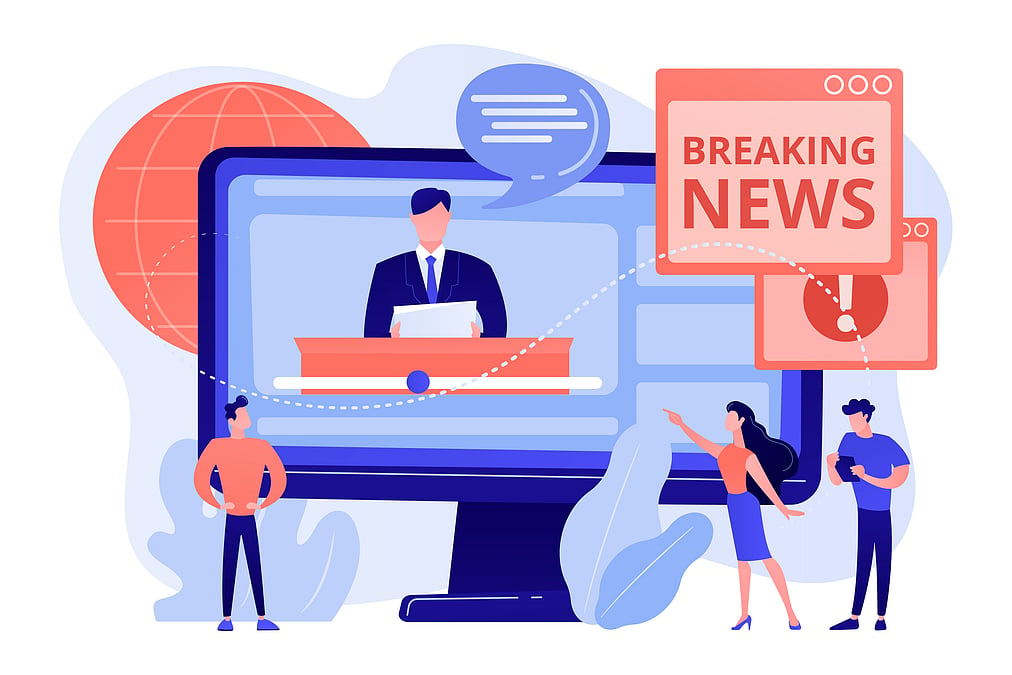Not known Details About Online News
Table of ContentsThe Best Strategy To Use For Online NewsOnline News - The FactsLittle Known Questions About Online News.Online News Things To Know Before You Get ThisFacts About Online News Revealed
For instance, numbers for the percentage of people paying for on-line news were within the margin of error for both studies. Allow's initial think about individuals that have access to news that you would normally have to pay for. It makes sense to begin below because some individuals have access to paywalled news with cost-free trials, via their task, and more.There are various types of accessibility, but the three most usual are subscriptions to on the internet news from a solitary brand, memberships to a print/digital bundle from a solitary brand, and a membership to numerous brand names aggregated in one area. Of these, digital-only subscriptions to a single brand are the most common form of accessibility in all 3 nations.
Paid information aggregators are fairly prominent in the US, primarily many thanks to Apple Information+, yet currently these are much much less usual than memberships to single information brand names. As we saw in the Executive Summary, people mainly have accessibility to among a little team of famous brand names. In the United States, over fifty percent of these individuals have access to either the New York Times or the Washington Message, and in the UK, it's The Times or the Telegraph.
The 9-Minute Rule for Online News
Many of this group have access due to the fact that they are paying for registrations with their very own money 75% in Norway and the UK, and 84% in the United States. Online News. For under-45s the figure is lower. Amongst those 45 and over, the large bulk of those who have gain access to are paying with their very own money.
In the United States and particularly Norway, numerous authors have introduced paywalls, which suggests even more individuals will certainly be asked to pay maybe heightening a sense of scarcity and developing a feeling that information might be worth spending for. In the UK, by contrast, only a fairly handful of publications attempt to charge for news.
Hereof it is intriguing to compare the different factors clients offer in the USA and United Kingdom for paying for on the internet news. Overall, the most essential element is the diversity and top quality of the web content. In both nations, subscribers believe they are improving information than from free sources.

Facts About Online News Revealed
These extra elements seem to be especially important for retention as they build practice and are less replicable elsewhere. For Norwegians also the diversity of web content prevailed together with ease and simplicity of use. 'Aftenposten is a severe newspaper with excellent top quality', stated one respondent, yet it was striking that 'sustaining great journalism' is less of an inspiration (21%) probably due to the fact that conventional media outlets are viewed as much less polarised in Norway.
Furthermore, around half of those who presently have open door state that they might begin paying if their cost-free gain access to goes out. This is motivating, and my sources possibly more motivating still is that these figures imply retention rates that approach those for memberships to video and audio streaming solutions like Netflix and Spotify.
It can likewise be viewed as a beneficial pointer that individuals do not always subscribe for life, and flaunts concerning the number of 'brand-new subscribers' may not be informing the whole story (Online News). There's significant 'churn' in this field, as lots of people end their free trials prior to they have to pay, or just cancel their subscriptions to invest their money on other find out this here things
Women, 37, Norway It set you back means also much and I can get round the paywall. Male, 36, US Too pricey, felt there was absolutely nothing I could not obtain totally free on Apple Information. Women, 19, UK In the UK, the variety of people that utilized to have actually accessibility to paid news (10%) is close to the number of individuals that presently have gain access to (9%) with the equal figures from the US and Norway greater still (albeit reduced than the number of people with gain access to).
Things about Online News
As we've already seen, existing subscribers are relatively delighted, however with income from digital advertising and marketing unclear several publishers will certainly be looking to increase the variety of brand-new clients. In contrasting our 3 nations we see some fascinating differences that could inform author approaches. We observe a very high proportion (40% in the US and 50% in the UK) that state that nothing might convince them to pay.
But in Norway, where interest in news has a tendency to be higher and where free information is more limited only 19% say they couldn't be encouraged. Cost and benefit are several of the vital aspects that could make a distinction. In Norway, a 3rd (30%) say they could subscribe if it was more affordable and 17% if they might pay to access numerous sites from a solitary repayment.
Publishers have actually progressively been offering differential rates to grab business from those unlikely to pay full price (e.g. overseas consumers and students). Paying to prevent intrusive promotions is one more possible route for authors, with around one in seven respondents in all 3 countries stating this this could tempt them to subscribe.

A Biased View of Online News
Some outlets now ask readers to register with them in order to be able to access a small number of articles for totally free. In all three countries less than half assume signing up is a reasonable trade, however it's likewise clear that people are not strongly opposed either.
In between 13% and 22% in our 3 nations say they signed up to access information web content in the in 2014. Some are additionally making use of various other methods to get around paywalls such as resetting cookies, transforming their browser settings, or also downloading and install specialized software program. Simply a third say they have ever attempted to do web link something such as this, as it requires a certain degree of electronic literacy, and many are probably not aware that is a possibility.
People have various sights about the rights and wrongs of trying to avoid paywalls. Few would argue that this is constantly justifiable, however some people do have reservations around important public-interest journalism only being readily available to those ready and able to pay for it. A paywalled expos of the UK government's handling of the coronavirus episode by the Sunday Times caused a heated discussion regarding the issue on Twitter, with some trying to openly share the full article.